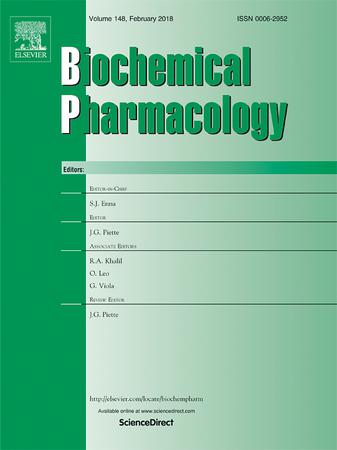肠道菌群和糖代脱氧胆碱在乳腺癌肝转移中的作用
IF 5.3
2区 医学
Q1 PHARMACOLOGY & PHARMACY
引用次数: 0
摘要
乳腺癌肝转移是一项重大的临床挑战,需要对其潜在机制有更深入的了解。在这项研究中,我们探讨了血清代谢物和肠道微生物群在乳腺癌肝转移中的作用,特别关注糖鹅脱氧胆酸钠盐(GCDC)的作用。采用液相色谱-质谱(LC-MS)分析血清代谢物,通过粪便样本的16S rDNA测序评估肠道微生物群组成。统计分析显示,肠道微生物群与GCDC水平之间存在很强的相关性,在乳腺癌、乳腺癌肝转移组和健康对照组中差异显著。通过高通量生物信息学筛选,鉴定出GCDC是一种与微生物群相关的代谢物。体外实验表明,GCDC抑制乳腺癌细胞的增殖、迁移和侵袭,同时诱导细胞死亡。在体内,GCDC治疗可以减少皮下肿瘤的生长并阻止肝转移,这一点可以通过降低肿瘤组织中Ki67的表达来证明。这些研究结果表明,GCDC通过抑制癌细胞的生长和迁移来抑制乳腺癌肝转移,强调了其作为乳腺癌患者肝转移早期检测的生物标志物和治疗药物的潜力。进一步研究其作用机制,探索其临床应用。本文章由计算机程序翻译,如有差异,请以英文原文为准。

Gut microbiota and glycochenodeoxycholic role in liver metastasis of breast cancer
Breast cancer liver metastasis presents a significant clinical challenge, requiring a deeper understanding of its underlying mechanisms. In this study, we explored the role of serum metabolites and gut microbiota in breast cancer liver metastasis, with a particular focus on the effects of glycochenodeoxycholic acid sodium salt (GCDC). Serum metabolites were analyzed using liquid chromatography-mass spectrometry (LC-MS), while gut microbiota composition was assessed through 16S rDNA sequencing of stool samples. Statistical analyses revealed a strong correlation between gut microbiota and GCDC levels, which varied markedly among breast cancer, breast cancer liver metastasis, and healthy control groups. GCDC was identified as a microbiota-related metabolite through high-throughput bioinformatics screening. In vitro experiments showed that GCDC inhibited breast cancer cell proliferation, migration, and invasion while inducing cell death. In vivo, GCDC treatment reduced subcutaneous tumor growth and prevented liver metastases, as evidenced by decreased Ki67 expression in tumor tissues. These findings suggested that GCDC suppresses breast cancer liver metastasis by inhibiting cancer cell growth and migration, underscoring its potential as a biomarker for early detection and a therapeutic agent for liver metastasis in patients with breast cancer. Further research is needed to clarify its mechanisms and explore its clinical applications.
求助全文
通过发布文献求助,成功后即可免费获取论文全文。
去求助
来源期刊

Biochemical pharmacology
医学-药学
CiteScore
10.30
自引率
1.70%
发文量
420
审稿时长
17 days
期刊介绍:
Biochemical Pharmacology publishes original research findings, Commentaries and review articles related to the elucidation of cellular and tissue function(s) at the biochemical and molecular levels, the modification of cellular phenotype(s) by genetic, transcriptional/translational or drug/compound-induced modifications, as well as the pharmacodynamics and pharmacokinetics of xenobiotics and drugs, the latter including both small molecules and biologics.
The journal''s target audience includes scientists engaged in the identification and study of the mechanisms of action of xenobiotics, biologics and drugs and in the drug discovery and development process.
All areas of cellular biology and cellular, tissue/organ and whole animal pharmacology fall within the scope of the journal. Drug classes covered include anti-infectives, anti-inflammatory agents, chemotherapeutics, cardiovascular, endocrinological, immunological, metabolic, neurological and psychiatric drugs, as well as research on drug metabolism and kinetics. While medicinal chemistry is a topic of complimentary interest, manuscripts in this area must contain sufficient biological data to characterize pharmacologically the compounds reported. Submissions describing work focused predominately on chemical synthesis and molecular modeling will not be considered for review.
While particular emphasis is placed on reporting the results of molecular and biochemical studies, research involving the use of tissue and animal models of human pathophysiology and toxicology is of interest to the extent that it helps define drug mechanisms of action, safety and efficacy.
 求助内容:
求助内容: 应助结果提醒方式:
应助结果提醒方式:


